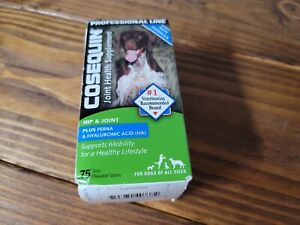Connect with a verified veterinarian in minutes. Licensed vets are available 24/7 to answer your questions. No need to worry about your furry family member.
Cosequin has become a popular treatment for arthritis in dogs and other animals. It’s widely used and is considered safe. However, what happens if your dog eats too much Cosequin?
In this article, we’ll take a look at what Cosequin is and whether or not it can make your dog sick. Let’s get started!
What is Cosequin?
Cosequin is an OTC supplement that works to support dogs’ joints. In dogs who have arthritis, Cosquin can help lower pain levels while also strengthening joints to help maintain normal movement. This product comes in various forms, including tablets and chews for dogs.
Cosequin contains glucosamine, which acts as an anti-inflammatory. It also contains chondroitin, which works to stop the destruction of the cartilage. When it comes to effectiveness, there haven’t been many studies on whether or not glucosamine and chondroitin are effective but there are some promising results so far.
What is Glucosamine?
Glucosamine is a natural substance found in cartilage, where it works to cushion the joints. The substance is often found in supplements and medications such as Cosequin. This supplement for dogs contains glucosamine hydrochloride.
Glucosamine supports our fur babies’ joints by stimulating cartilage growth. It also works to thicken the synovial fluid to improve joint function and slow the development of arthritis. Dogs taking glucosamine may feel less pain and stiffness as they age.

Review symptoms, medications & behavior to keep your pets healthy with a Vet Online in just minutes.
Ask a Vet Live NowWhat is Chondroitin?
Chondroitin is also a naturally occurring substance in the body. It’s also a component in cartilage. This substance works to keep cartilage healthy by absorbing fluid (especially water) into connective tissues. Chondroitin may also work to block enzymes that destroy cartilage and help the body build new cartilage.
In dogs, chondroitin helps maintain and repair their joints. It also works to increase lubrication in joints and can relieve pain and discomfort in the joints.
What Else Does Cosequin Contain?
Cosequin supplements also contain MSM (methylsulfonylmethane) and manganese. MSM is another naturally occurring substance in the body. It has an anti-inflammatory and antioxidant action that can reduce pain and stiffness in a dog’s joints.
The supplements also contain manganese. Manganese helps a dog’s body produce energy, metabolize protein and carbs, and to make fatty acids. It also plays a part in the health and maintenance of bone and cartilage.
Cosequin is considered safe for dogs. However, can too much Cosequin make a dog sick?
Cosequin & Dogs
The short answer is it is possible for a dog to overdose on Cosequin. Dogs who have too much glucosamine may experience harmful side effects, and it can even lead to death.
Death from eating too much Cosequin is rare in dogs. Most dogs will develop some vomiting and diarrhea and make a full recovery.
However, it’s still necessary to monitor your dog’s condition and watch for the symptoms listed below.
Symptoms of Glucosamine Overdose in Dogs
You may notice these symptoms if your dog has had too much Cosequin:
- Nausea and vomiting
- Lethargy
- Bone, muscle, cartilage pain
- Jaundice
- Frequent urination
- Increased thirst
- Internal damage
- Internal hemorrhage
- Coma
If you notice any of these symptoms in your dog, call the vet right away. This could be a medical emergency.
Be sure to take the Cosequin packaging so the vet can check the product label for dosage information. And if possible, try to figure out how many pills your dog may have eaten.
Treatment for Glucosamine Overdose in Dogs
At the vet’s, they will perform a complete physical on your dog, which may include lab work and other tests. If the overdose happened fairly recently, then the vet may induce vomiting and use activated charcoal to help remove the toxin from your dog’s digestive system. Your dog may also need an IV to replace fluids and give medications to treat symptoms as they come up.
Depending on the severity of your dog’s symptoms, he may need to stay in the hospital for a day or so. The vet may want to monitor the dog’s symptoms and make sure he’s stabilized before going home.
The good news is that in most cases when a dog receives prompt medical treatment, they will go on to make a full recovery!
Connect with a verified veterinarian in minutes. Licensed vets are available 24/7 to answer your questions. No need to worry about your furry family member.

Aisling O'Keeffe, MVB CertSAM ISFMCertAdvFB
This article has been reviewed and approved by an independent Veterinarian: Aisling qualified as a vet 7 years ago from University College Dublin. She has worked in a mixture of UK small animal hospitals along with Irish practices. She worked for 3 years in a feline-only hospital where she further developed her feline medicine and surgery skills. She currently lives and works in a small animal hospital in Cork, Ireland.
Review symptoms, medications & behavior to keep your pets healthy with a Vet Online in just minutes.
Ask a Vet Live Now






